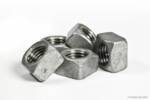Kyle's FAQs
The term “lock washer” can include a huge variety of different products used in many different applications that often are very specific and can include many different grades, materials and purposes. When our customers refer to a lock washer, we assume they are referencing a “split lock washer” that is a generic lock washer that... Read more

Portland Bolt is unaware of any information that addresses this question. Plastic sleeves seem to be a “gray area” due to the fact that no specifications cover them or design guides mention them. AISC Design Guide 1, 2nd Edition, Base Plate And Anchor Rod Design, Page 49, does address steel sleeves and has information on... Read more
The typical fix to this issue is to buy a larger sleeve for the next imperial (inch) diameter up and duct tape the sleeve to the rod to fix it in place. A less-frequently used alternative is to buy a smaller sleeve and cut the sleeve to fit the anchor bolt. According to our customers... Read more
Not really. Plastic anchor sleeves are mass produced in standard sizes and are not feasible to be custom made with custom diameters or lengths. The tooling/molds to create a custom size are expensive and have long lead times to such a degree that the manufacturers of the sleeves are unwilling to pursue custom tooling. If a... Read more
There is no mention of any ASTM A615 grade being specifically used for anchor bolts in any ACI, AISC or ASTM specifications that we are aware of. Simply, the A615 grade is a rebar specification for concrete reinforcement; it is not an anchor bolt or raw steel specification. Using rebar for anchor bolts does present... Read more
You can watch a video covering four of these point types: the chamfer, semi-cone, chisel, and 45-degree angle cut. Saw cut end When a large diameter or small quantity of bolts is required, Portland Bolt will saw cut the steel round bar to create the cut lengths for the finished fastener. A saw cut end... Read more
Mechanical galvanizing (ASTM B695) is a process in which fasteners are tumbled in a barrel with a mixture of water, zinc powder, other chemicals, and glass impact beads. As the parts are tumbled in the slurry, the zinc is “cold welded” to the fasteners. While some mechanical galvanizers can process parts that over a foot... Read more
Hot-dip galvanized nuts cannot be used on a plain finish bolt. Hot-dip galvanizing adds between 2 – 6 mils (.002” – .006”) of zinc to the threads of the bolt and due to this increased thread thickness, hot-dip galvanized nuts are tapped oversize to accommodate and create a workable fit. These oversized internal threads on... Read more

ASME B18.2.1 has a table that deals with the length tolerance for square, hex, heavy hex, and askew head bolts. It also has a section for lag screws as well as tighter tolerance cap screws. The tolerance varies greatly per diameter and length of the fastener. See the table below. ASTM A325 and A490 heavy... Read more
Along with shear plates and round malleable washers, malleable beveled washers are made with ASTM A47 cast malleable iron. See the following excerpts from ASTM A47. 11.3 Castings that have been repaired by the welding shall be reannealed so that the microstructure will comply with Section 8. (Section 8 of ASTM A47 lays out specific... Read more

